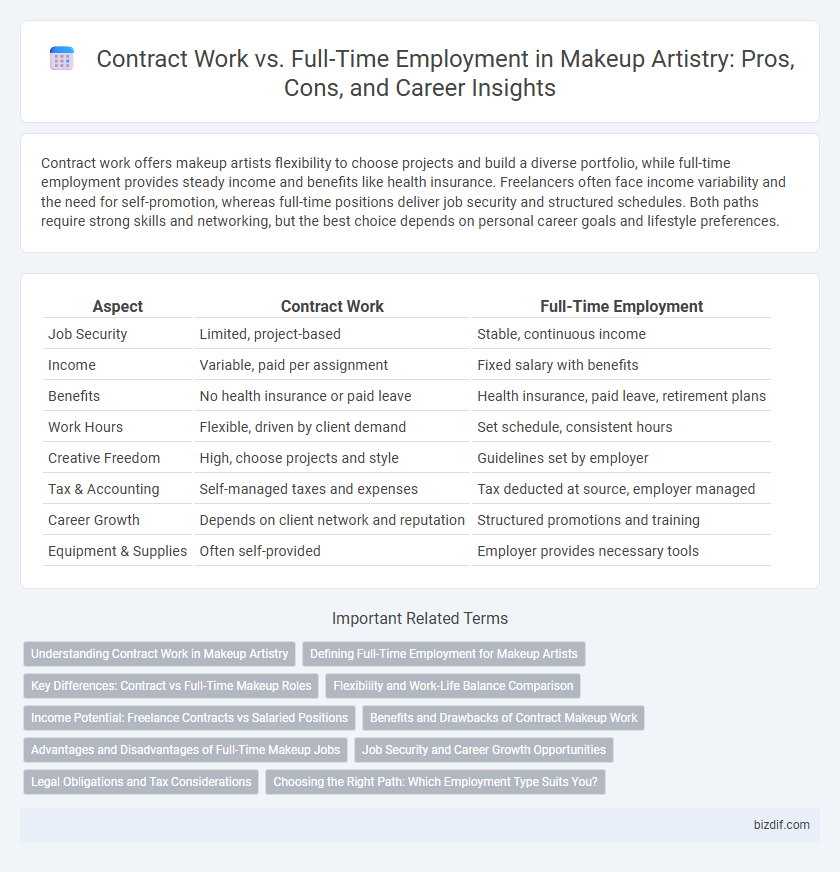Contract work offers makeup artists flexibility to choose projects and build a diverse portfolio, while full-time employment provides steady income and benefits like health insurance. Freelancers often face income variability and the need for self-promotion, whereas full-time positions deliver job security and structured schedules. Both paths require strong skills and networking, but the best choice depends on personal career goals and lifestyle preferences.
Table of Comparison
| Aspect | Contract Work | Full-Time Employment |
|---|---|---|
| Job Security | Limited, project-based | Stable, continuous income |
| Income | Variable, paid per assignment | Fixed salary with benefits |
| Benefits | No health insurance or paid leave | Health insurance, paid leave, retirement plans |
| Work Hours | Flexible, driven by client demand | Set schedule, consistent hours |
| Creative Freedom | High, choose projects and style | Guidelines set by employer |
| Tax & Accounting | Self-managed taxes and expenses | Tax deducted at source, employer managed |
| Career Growth | Depends on client network and reputation | Structured promotions and training |
| Equipment & Supplies | Often self-provided | Employer provides necessary tools |
Understanding Contract Work in Makeup Artistry
Contract work in makeup artistry offers professionals flexibility, allowing them to collaborate with diverse clients and projects without long-term commitment. This employment type often requires artists to manage their own taxes, supplies, and scheduling, emphasizing entrepreneurial skills. Understanding contract work enables makeup artists to maximize income potential while honing versatility across various industry environments.
Defining Full-Time Employment for Makeup Artists
Full-time employment for makeup artists typically involves a fixed schedule with consistent hours, often ranging from 30 to 40 hours per week, providing stability through a regular paycheck and employee benefits such as health insurance and paid time off. Makeup artists in full-time roles often work for salons, theaters, or film production companies, gaining access to ongoing professional development and networking opportunities within the industry. These positions generally require contractual agreements that outline job responsibilities, work hours, and company policies, ensuring clear expectations and job security.
Key Differences: Contract vs Full-Time Makeup Roles
Contract makeup artistry roles offer flexible schedules, project-based pay, and the opportunity to work with diverse clients, while full-time makeup positions provide consistent income, employee benefits, and long-term job security. Contract artists often manage their own taxes and supplies, whereas full-time employees typically receive employer-covered materials and tax withholdings. Understanding these differences helps makeup professionals choose between autonomy and stability in their careers.
Flexibility and Work-Life Balance Comparison
Contract makeup artistry offers significant flexibility, allowing artists to choose projects, set schedules, and manage work-life balance more independently than full-time employment. Full-time makeup artists often benefit from job security, consistent income, and employee benefits but face rigid hours and less control over their daily routines. Balancing personal time with professional demands tends to be easier in contract roles, which cater to artists seeking adaptable work patterns.
Income Potential: Freelance Contracts vs Salaried Positions
Freelance makeup artists often experience fluctuating income potential driven by client volume, seasonal demand, and event frequency, allowing high earners to capitalize on peak periods and premium rates. In contrast, full-time salaried makeup artists benefit from consistent, stable income, often accompanied by benefits such as health insurance and paid leave, which can offset lower immediate earnings. Balancing contract work versus full-time employment requires evaluating the trade-off between variable, potentially higher freelance earnings and the security of salaried positions within salons, production studios, or cosmetic brands.
Benefits and Drawbacks of Contract Makeup Work
Contract makeup work offers flexibility and the opportunity to work with diverse clients and projects, allowing artists to build a varied portfolio and set their own schedules. However, drawbacks include lack of consistent income, limited employee benefits such as health insurance and paid leave, and the responsibility of managing taxes and business expenses independently. Full-time employment provides financial stability and benefits like healthcare and retirement plans, but often restricts creative freedom and demands adherence to fixed hours.
Advantages and Disadvantages of Full-Time Makeup Jobs
Full-time makeup jobs offer consistent income, steady benefits such as health insurance, and opportunities for skill development within established brands. However, they often require strict schedules, less creative freedom, and potential limitations on working with diverse clients. Stability and career progression are balanced against reduced flexibility and the risk of burnout in high-demand salon environments.
Job Security and Career Growth Opportunities
Contract work in makeup artistry offers flexible project choices but often lacks job security and consistent income compared to full-time employment. Full-time positions provide stability, benefits, and clearer pathways for career advancement within established beauty brands or studios. Professionals seeking long-term growth and financial reliability typically prefer full-time roles despite the creative freedom freelance contracts may allow.
Legal Obligations and Tax Considerations
Contract makeup artists must manage self-employment taxes, file quarterly estimated tax payments, and maintain detailed expense records to maximize deductible business costs. Full-time employment typically includes employer withholding for income taxes, Social Security, and Medicare, alongside benefits such as workers' compensation and unemployment insurance. Understanding the distinct legal responsibilities and tax implications of each work arrangement helps professionals ensure compliance and optimize financial planning in the makeup artistry industry.
Choosing the Right Path: Which Employment Type Suits You?
Choosing between contract work and full-time employment in makeup artistry depends on your career goals, flexibility needs, and income stability preferences. Contract work offers diverse opportunities and creative freedom ideal for freelancers seeking varied projects and flexible schedules, while full-time positions provide steady income, benefits, and consistent client relationships perfect for those valuing security and career growth within a company. Evaluating your priorities in work-life balance, financial stability, and professional development will guide you in selecting the employment type that best supports your makeup artistry career.
Contract work vs Full-time employment Infographic

 bizdif.com
bizdif.com